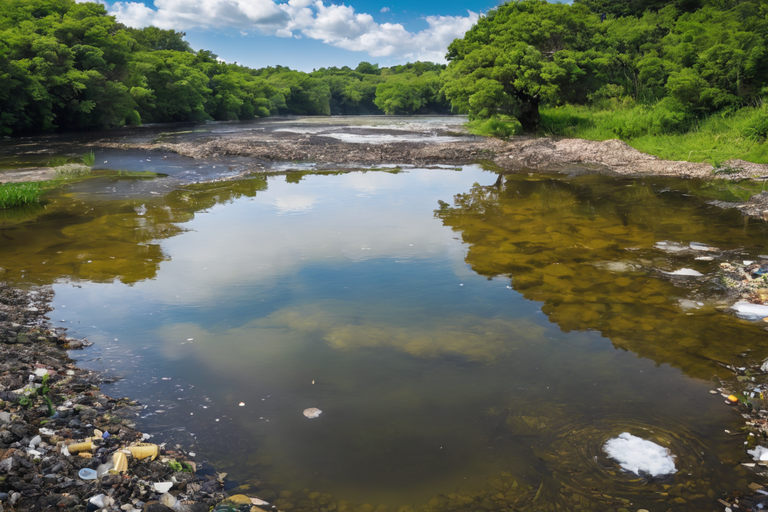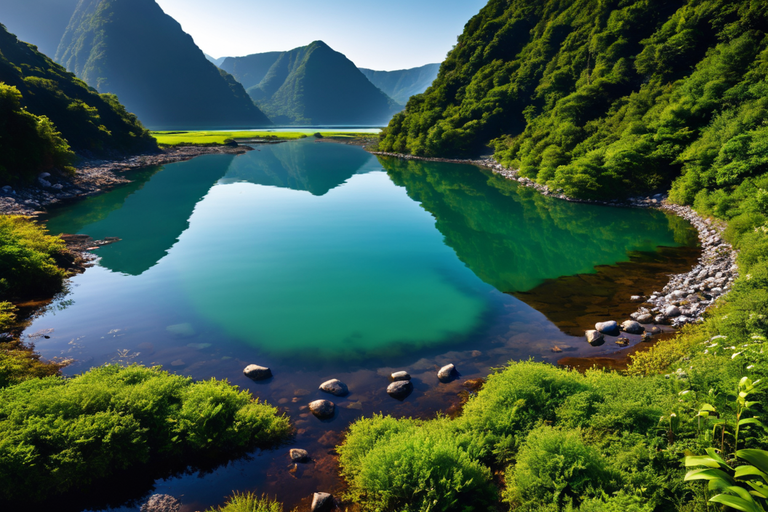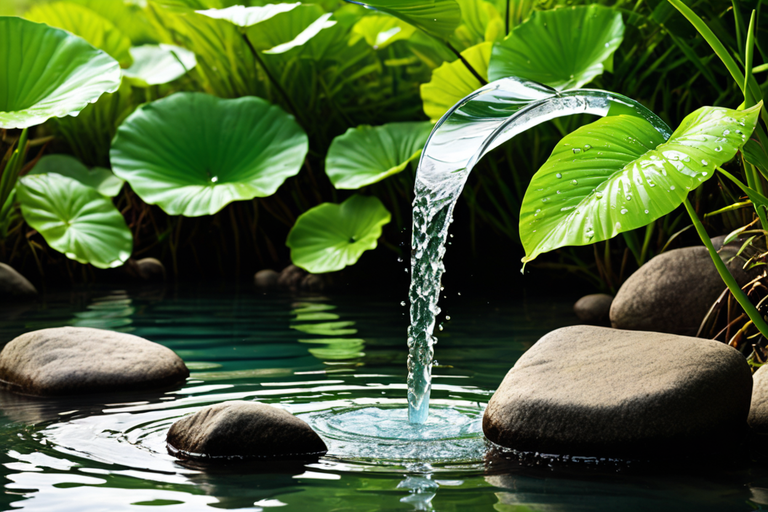Uncover the shocking realities of water pollution in our environment with this eye-opening guide. Dive into the dirty truth now!
Topics
- Causes of Water Pollution
- Effects on Wildlife
- Human Health Concerns
- Economic Impact
- Solutions and Prevention
- Final Thoughts
- Video and Transcript
As we delve deeper into the issue of water pollution, we uncover shocking truths that reveal the extent of damage caused to our environment. The contamination of our water sources affects aquatic life and poses serious health risks to humans. Chemical pollutants, plastic waste, and industrial runoff continue to poison our waters, disrupting the delicate balance of nature.
The alarming reality is that many communities worldwide do not have access to clean and safe drinking water due to pollution. This disparity highlights the urgent need for global action to address this crisis and ensure environmental wellness for all. We must all recognize our individual impact on water pollution and take steps toward reducing our carbon footprint in order to protect this precious resource for future generations.
When we turn on our faucets, we expect clean, clear water to flow. But the reality is that our water sources are under threat from pollution. Water pollution is a global issue that impacts the environment and our health and livelihoods. In this guide, we will dive into water pollution’s causes, effects, and solutions to better understand its impact on our world.

Check your environmental impact, and dive into the dirty truth of water pollution. #savewater #cleanwater #pollutionprevention
Causes of Water Pollution
Water pollution can be attributed to various sources, from industrial waste to agricultural practices. Industries release harmful chemicals and toxins into water bodies, contaminating and endangering aquatic life. Similarly, runoff from farms carrying fertilizers and pesticides can seep into rivers and lakes, disrupting ecosystems. Oil spills and leaks further exacerbate the problem, while the prevalence of plastics and microplastics in our waterways poses a severe threat to marine life.
Water pollution is the contamination of water bodies by harmful substances. Various factors, including industrial waste, sewage, and agricultural runoff can cause it. Water pollution can seriously impact human health, wildlife, and ecosystems. Here are some of the leading causes of water pollution:
Industrial waste: Industries discharge a variety of pollutants into waterways, including chemicals, metals, and organic matter. These pollutants can be toxic to aquatic life and can also make water unsafe for drinking or recreation.
Sewage: Untreated sewage can contain harmful bacteria, viruses, and parasites that can cause a variety of diseases in humans. Sewage can also contribute to nutrient pollution, which can lead to algal blooms.
Agricultural runoff: Runoff from farms can carry fertilizers, pesticides, and animal waste into waterways. These pollutants can harm aquatic life and can also contribute to nutrient pollution.
Urban runoff: Runoff from streets, parking lots, and other paved surfaces can carry pollutants such as oil, grease, and litter into waterways.
Oil spills: Oil spills can have a devastating impact on marine life and ecosystems. Oil can coat the feathers of birds, making it difficult for them to fly and stay warm. Oil can also smother fish and other aquatic life.
Atmospheric deposition: Pollutants such as nitrogen and sulfur oxides can enter the atmosphere from the burning of fossil fuels. These pollutants can then be deposited back onto the earth’s surface through rain and snow, contaminating waterways.
Plastic pollution: Plastic pollution is a growing problem that is having a devastating impact on our oceans, wildlife, and even human health. Every year, millions of tons of plastic waste end up in our oceans, where it can harm marine life, enter the food chain, and break down into microplastics that can contaminate our drinking water.
Climate change: Climate change can exacerbate water pollution in a number of ways. For example, rising water temperatures can lead to increased algal blooms. Climate change can also lead to more extreme weather events, such as floods and droughts, which can wash pollutants into waterways.
These are just a few of the many causes of water pollution. Water pollution is a serious problem that needs to be addressed in order to protect our water resources and the health of our planet.
Effects on Wildlife
Wildlife bears the brunt of water pollution, with fish and marine life suffering greatly from contaminated habitats. The loss of biodiversity and disruption of aquatic ecosystems can have far-reaching consequences, impacting not only the creatures that call these water bodies home but also the delicate balance of nature. Endangered species face an uphill battle as they struggle to survive in polluted environments.
Human Health Concerns
Water pollution causes a myriad of health concerns. Drinking contaminated water can lead to serious illnesses and diseases, threatening public health. Additionally, the impact on food sources, such as fish caught in polluted waters, can expose individuals to harmful toxins and chemicals. The spread of waterborne diseases further compounds the issue, highlighting the urgent need to address water pollution.
Economic Impact
The economic ramifications of water pollution are significant. The costs associated with cleaning up polluted water sources can be staggering, draining resources that could be allocated elsewhere. Additionally, industries such as tourism and recreation suffer as polluted water bodies lose their appeal to visitors. Fishing and aquaculture industries also take a hit, facing declines in production and profitability due to contaminated habitats.

Solutions and Prevention
A multifaceted approach is needed to combat water pollution. Environmental regulations must be enforced to hold industries and individuals accountable for their actions. Implementing sustainable practices in industries and agriculture can help reduce the amount of pollutants entering our waterways. Community initiatives, such as clean-up efforts and awareness campaigns, are crucial in protecting and preserving our water sources for future generations.
We can do many things at home and in our communities to combat water pollution and keep our water clean. Here are some ways to make a difference:
Individual Actions:
- Reduce what goes down the drain: Be mindful of what you flush or pour down the sink. Don’t dispose of medication, paint, oil, or harsh chemicals this way. Use phosphate-free detergents and cleaning products.
- Conserve water: Every drop counts! Take shorter showers, fix leaky faucets, and only run washing machines and dishwashers when full. This reduces the amount of wastewater that needs treatment.
- Properly dispose of pet waste: Pet waste can carry harmful bacteria that can contaminate waterways. Always pick up after your pet and dispose of waste in the trash.
- Be mindful of yard care products: Opt for natural fertilizers and pesticides whenever possible. When using chemicals, follow the instructions carefully and avoid over-applying them.
Community Actions:
- Support organizations working on clean water: Many organizations are dedicated to protecting our water sources. Consider volunteering your time or donating to a cause you care about.
- Spread awareness: Talk to your friends and family about the importance of clean water and how they can help.
- Participate in clean-up events: Organize or join a local river or beach clean-up to remove trash and debris from waterways.
- Stay informed: Get involved in local water quality issues and advocate for clean water policies.
Additional Tips:
- Look for water-efficient appliances: When replacing appliances, choose water-saving models.
- Wash your car at a car wash: Car washes are designed to capture and treat wash water to prevent it from polluting storm drains.
- Support sustainable businesses: Look for companies committed to sustainable practices and reducing water pollution.
By taking these steps, we can all help protect our precious water resources and ensure clean water for future generations.
Final Thoughts
Water pollution is a pressing issue that demands our attention and action. By understanding its causes, effects, and solutions, we can work towards a cleaner, healthier future for our planet. It is up to every one of us to take responsibility for our actions and make a positive impact on the environment. Together, we can make a difference and ensure that clean, safe water is available for all.
Video Transcript
Have you ever wondered why the crystal clear streams and rivers of our childhood stories have turned murky and foul? Why is the vibrant aquatic life that once flourished gasping for survival? The answer, unfortunately, is water pollution. Now, let’s delve into the murky waters of this issue. Water pollution occurs when harmful substances, often chemicals or microorganisms, contaminate a body of water, rendering it dangerous to the creatures that depend on it. The pollutants might be the byproducts of industrial processes, runoff from agricultural processes, or everyday human life waste products. Consider the industrial sector. It’s the culprit behind heavy metal contamination. Metals like lead, mercury, and cadmium, when dumped into water bodies, can cause severe health issues in people, like kidney damage and neurological disorders. For our feathered and finned friends, the consequences are equally dire, leading to decreased population and in some cases, extinction. Then there’s agriculture, with its excessive use of fertilizers and pesticides. These chemicals leach into the ground, eventually finding their way into our water bodies. They trigger the growth of harmful algal blooms, a phenomenon known as eutrophication, which suffocates fish and disturbs the balance of aquatic ecosystems. And we must remember the everyday waste we generate. Plastics, discarded medications, personal care products. These all end up in our rivers and oceans, causing harm to marine life and entering our food chain, leading to many health problems.
So, we’ve painted a grim picture. But it’s not all doom and gloom. There are solutions at hand. At the industrial level, stricter regulations can be implemented, requiring industries to treat their waste before disposal. This would significantly reduce the amount of toxic substances entering our water bodies. In agriculture, using organic farming methods and controlled use of fertilizers can help reduce the amount of chemicals leaching into the ground. As individuals, we can make a difference, too. By reducing our use of plastics, properly disposing of medications and personal care products, and supporting companies that prioritize environmental responsibility, we can help keep our water bodies clean.
Water pollution, a grave issue we face today, harms people, animals, and the environment. It’s caused by industrial waste, agricultural runoff, and everyday human waste. But by implementing stricter regulations, adopting more sustainable farming practices, and making conscious consumer choices, we can begin to clear the waters for the health and survival of all creatures on this blue planet. Remember, every drop in the ocean counts, and so does every action we take to preserve it. It’s time to turn the tide on water pollution. Clear, clean water is not just a luxury; it’s a necessity and a right for all life on Earth. Thanks for watching, and may the bliss be with you.






We often overlook the importance of keeping our water clean not only for our own health but also for the creatures that depend on it. Our actions directly impact the quality of water and the ecosystem it sustains. By coming together and taking responsibility for protecting this vital resource, we can ensure a healthier environment for ourselves and all living beings that rely on clean water for survival.
Every small effort we make to reduce pollution and preserve water sources contributes to a greater cause – the well-being of our planet. The ripple effect of our actions can lead to lasting positive changes in the quality of water and ultimately, in our overall health. Let’s unite in this mission to protect our waterways, not just for ourselves but also as a commitment to preserving the balance of nature that sustains us all. Together, we have the power to make a difference and create a cleaner, healthier world for future generations!